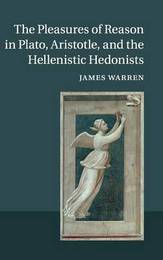
|
The Pleasures of Reason in Plato, Aristotle, and the Hellenistic Hedonists
Hardback
Main Details
| Title |
The Pleasures of Reason in Plato, Aristotle, and the Hellenistic Hedonists
|
| Authors and Contributors |
By (author) James Warren
|
| Physical Properties |
| Format:Hardback | | Pages:248 | | Dimensions(mm): Height 229,Width 16 |
|
| Category/Genre | Western philosophy - Ancient to c 500 |
|---|
| ISBN/Barcode |
9781107025448
|
| Classifications | Dewey:128.33 |
|---|
| Audience | | Professional & Vocational | |
|---|
| Illustrations |
1 Line drawings, black and white
|
|
Publishing Details |
| Publisher |
Cambridge University Press
|
| Imprint |
Cambridge University Press
|
| Publication Date |
27 November 2014 |
| Publication Country |
United Kingdom
|
Description
Human lives are full of pleasures and pains. And humans are creatures that are able to think: to learn, understand, remember and recall, plan and anticipate. Ancient philosophers were interested in both of these facts and, what is more, were interested in how these two facts are related to one another. There appear to be, after all, pleasures and pains associated with learning and inquiring, recollecting and anticipating. We enjoy finding something out. We are pained to discover that a belief we hold is false. We can think back and enjoy or be upset by recalling past events. And we can plan for and enjoy imagining pleasures yet to come. This book is about what Plato, Aristotle, the Epicureans and the Cyrenaics had to say about these relationships between pleasure and reason.
Author Biography
James Warren is a Reader in Ancient Philosophy at the University of Cambridge and a Fellow of Corpus Christi College. He is the author of Epicurus and Democritean Ethics (2002), Facing Death: Epicurus and his Critics (2004) and Presocratics (2007), and the editor of The Cambridge Companion to Epicureanism (2009) and, with Frisbee Sheffield, The Routledge Companion to Ancient Philosophy (2014). He has published articles on a wide range of topics in ancient philosophy.
Reviews'Warren perfects the virtues exemplified in J. C. B. Gosling and C. C. W. Taylor, The Greeks on Pleasure, thanks to his historical accuracy, his subtle analysis of metaphors and analogies (consider, paradigmatically, the weighing and measuring of pleasures and pains in his chapter 5) and of other literary elements in the works he reads. He treads carefully whenever needed, and nurtures the sensitivity for aesthetic enjoyments, although they go beyond the scope of this inquiry. Consequently, I highly recommend this book to all specialists in ancient philosophy as well as budding ancient philosophy students. Both groups will benefit from experiencing anew, or for the first time, the understanding that trailblazing contributions do not emerge primarily from proposing a new exegesis of this or that line of text.' Georgia Mouroutsou, Bryn Mawr Classical Review
|